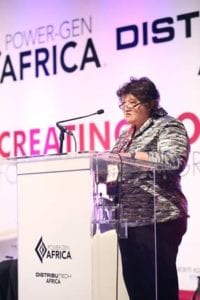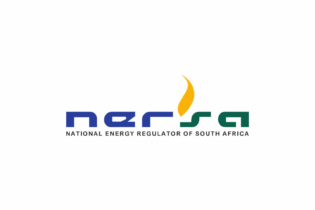
Minister of Public Enterprises Lynn Brown addressed delegates at POWER-GEN & DistribuTECH Africa 2016
In line with this, the minister announced that as part of the second phase of the Eskom Power Plant Engineering Institute (EPPEI) programme, Eskom would establish a specialisation centre focusing on nuclear technology. Eskom signed its second five-year, R170 million EPPEI funding agreement with South African universities during the conference proceedings this morning. The EPPEI programme funds eight Eskom specialisation centres at six universities.
Also speaking at this morning’s opening session, Nigel Blackaby, Director of Conferences at event organisers PennWell International Power Group, noted: “The energy industry is undergoing a period of major change that stakeholders have to respond to. The sector is awash with so-called disruptive technologies, the rise of renewables, the emergence of smart grids, decentralised generation and smarter storage technology. It’s a heady cocktail, but it’s also a very exciting one, opening up all sorts of possibilities.” Blackaby cited a recent McKinsey report finding that globally, the proportion of people with no access to power would fall from 30% to 17% by 2040, but that in Africa this trend would be reversed, with the percentage of people without power expected to grow from 49% to 75%. “There is no one solution to solve all of Africa’s power challenges, but through a combination of power and distribution technologies, and regional collaboration within power pools, great strides could be made to meet future demand,” he said. Renewable options William Price, Country Manager at Enel Green Power South Africa, noted that a changing environment demanded creative and innovative approaches to power generation and distribution. “Africa has an abundance of renewable resources available, but availability is not the only consideration,” he said. “Political stability, appropriate regulatory environments and government support for public private partnership structures are also factors investors consider,” he noted. “We need to focus on how we use renewable and smart technologies and make the consumer the centre of the energy value chain.” George Njenga, Regional Executive at GE Steam Power Systems, Sub-Sahara Africa said: “Africa’s resource irony is we have abundant oil and gas, sunshine, wind and vast coal reserves, yet Africa is still power starved.” “The challenge is urgent,” he said. “We need to work together to bring about the change the continent needs.” Nejnga said smarter, more advanced technologies should be deployed to maximise the value of existing infrastructure. For example, he noted that advanced steam power generation technologies would allow coal plants to optimise their outputs and reduce harmful emissions. The opening of POWER-GEN & DistribuTECH Africa 2016 has received record breaking attended of over 3 000 power industry stakeholders, utilities and sub-Saharan government officials from pan-Africa and abroad. The event is currently underway at the Sandton Convention Centre. The three-day conference and expo is themed ‘Creating Power for Sustainable Growth’, showcasing strategies and technologies for advanced power generation and distribution.





